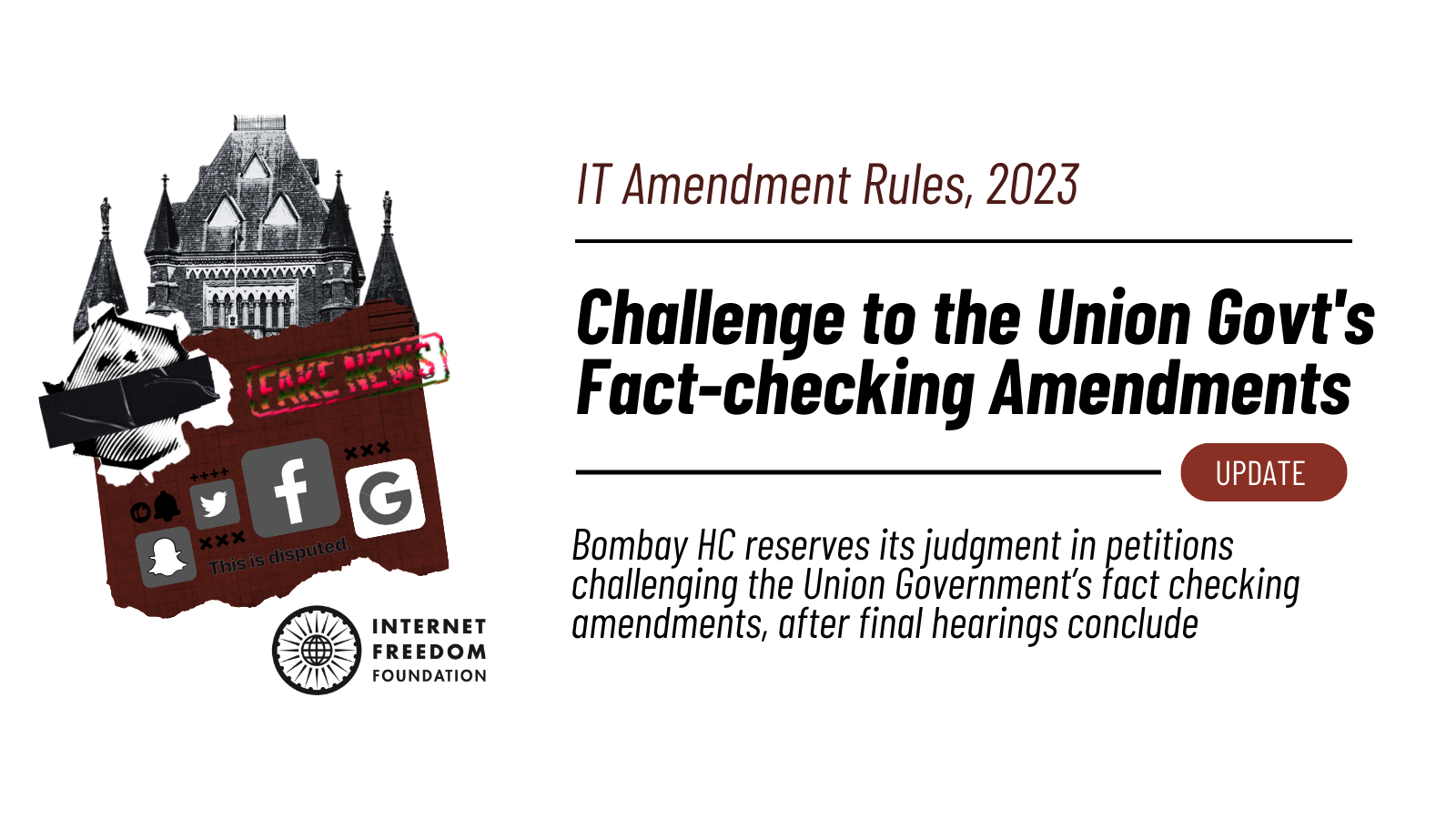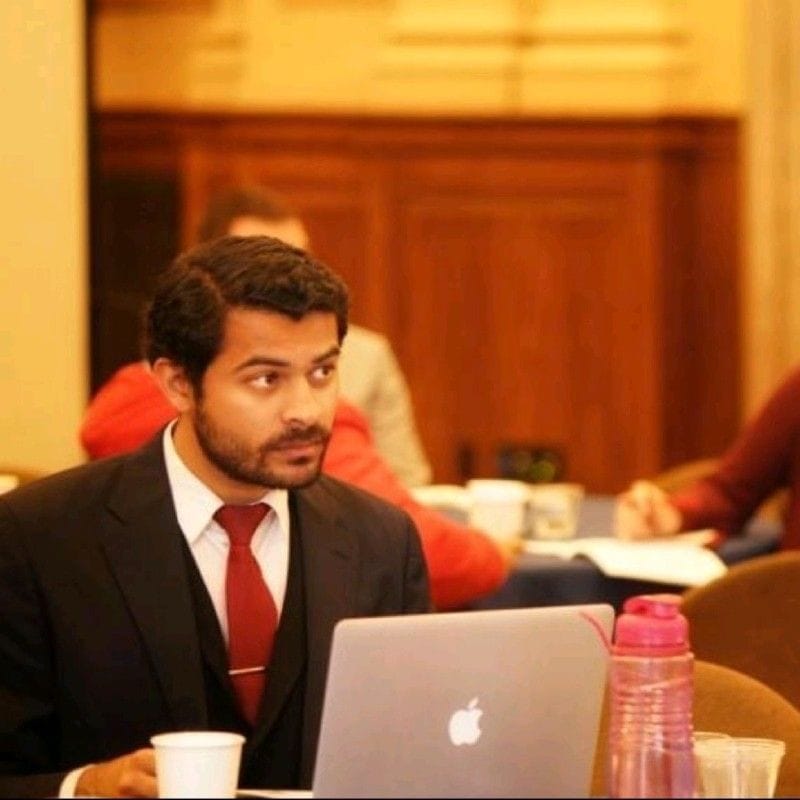
tl;dr:
The Bombay High Court has reserved its judgment in a batch of petitions filed by Association of Indian Magazines, Kunal Kamra and others, challenging the constitutionality of the Information Technology (Intermediary Guidelines and Digital Media Ethics Code) Amendment Rules, 2023 (‘IT Amendment Rules, 2023’) dated April 6, 2023. These rules permit a fact check unit of the Union Government to identify “fake or false or misleading” online content “related to the business of the Central Government” and demand its removal from the internet.
Why should you care?
The fact check unit to be constituted under the IT Amendment Rules, 2023 will be the deciding authority for what information is false or true or accordingly, what information can stay online or must be taken down. If the intermediary does not remove information flagged by the fact check unit, it risks losing its safe harbour under Section 79 of the IT Act. This could seriously threaten the independence of the free press on the Indian internet.
Rejoinder Submissions have been completed
Pursuant to the completion of rejoinder submissions by the counsels for the Petitioners, the bench of the Bombay High Court led by Justice Gautam Patel has reserved the matter for judgment. Mr. Gautam Bhatia, representing the Association of Indian Magazines, started rejoinder submissions from the Petitioners’ side on September 27, 2023.
Mr. Bhatia submitted that the government's argument claiming no compulsion on intermediaries is inaccurate. He argued that any option to the intermediary in this regard is ‘illusory’. Mr. Bhatia emphasised that, following the flagging of content by the fact check unit, intermediaries only have the choice to remove it, as any action short of this exposes them to liability and the loss of safe harbour protection. Further, Mr. Bhatia contended that the notion of a chilling effect is not limited to penal provisions, as argued erroneously by the government, but is built into the safe harbour framework. He maintained that the chilling effect is not speculative in nature, but directly pertains to potential liabilities and the likelihood of self-censorship by users.
A third key point raised by Mr. Bhatia centred on proportionality. He argued that there are less restrictive means available to achieve the goal of combating misinformation. He pointed out that even before the introduction of the IT Amendment Rules, 2023, the Press Information Bureau (‘PIB’), the government’s nodal agency for disseminating information, conducted fact-checking through its extensive social media presence. Mr. Bhatia questioned why the existing status quo was considered insufficient. Additionally, he highlighted tools and features, such as Community Notes on X (formerly known as Twitter), that enable social media platform users to provide supplementary context for content.
Moreover, he argued that the determination of what qualifies as “reasonable efforts” is not left to the intermediary. He stressed that as soon as an intermediary becomes liable for a lawsuit and has to appear in court, their safe harbour protection is already lost. Mr. Bhatia reinforced his arguments by emphasising that the Indian Constitution, under Art. 19(2), exhaustively enumerates restrictions, leaving no room for additional restrictions to be imposed.
In his continued rejoinder submissions on September 29, 2023, Mr. Navroz Seervai reiterated Mr. Bhatia’s assertion that once the fact-checking unit identifies information as false, fake, or misleading in the context of the Central Government’s business, intermediaries have no alternative but to remove it. Mr. Seervai underscored that the fact check unit is not even obliged to explain why content it flags is labelled as “false,” “fake,” or “misleading,” effectively making the Central Government the sole authority in this regard. Mr. Seervai contended that the only recourse available then is to file a writ petition.
He also challenged the government’s submission, which aimed to downplay the parallels between the current case and Shreya Singhal, where it asserted that the judgment solely pertained to penal law. Mr. Seervai also opposed the government’s argument to narrowly interpret or tailor the impugned provisions, emphasising that without such adjustments, the IT Amendment Rules, 2023 would be untenable. He emphasised that the government was effectively attempting to persuade the court to rewrite the provisions of the law.
Mr. Seervai refuted the government’s argument to restrict the scope of the term “information,” asserting that the definition of “information” is evidently broad. Therefore, any reinterpretation by the court would essentially entail a legislative function. Mr. Seervai extensively deliberated on what constitutes the “business of the Central Government”, contending that a straightforward reading of Entry 97 of List I of the Seventh Schedule makes it evident that everything – apart from items in the List II – falls under the government’s purview.
He further contested the government’s assertion of a constitutional obligation to expose falsehoods, asserting that such a claim is not sustainable, as precedents demonstrate that the State should not dictate what is true or false in the marketplace of ideas.
History of this Case in the Bombay High Court
The Association of Indian Magazines, Kunal Kamra and others filed writ petitions challenging the constitutionality of provisions relating to the “fact check unit” before the Bombay High Court. In April, 2023, as a result of the petitions, the Union Government provided an undertaking not to constitute its fact check unit. The undertaking, having been accepted by the Bombay HC, has been operating as an effective stay against the amendment.
In June 2023, the Bombay High Court directed that all these petitions be scheduled for final hearing on July 6 and 7, 2023. During these hearings, Senior Advocate Navroz Seervai expressed concerns regarding the Rules and questioned the government’s ability to impartially adjudicate these matters while upholding the principles of natural justice. Mr. Gautam Bhatia, representing the Association of Indian Magazines, argued that the government should not unilaterally assume the role of determining truth. He highlighted an implicit coercive element in the IT Amendment Rules, 2023, where intermediaries risk losing their safe harbour protection if they fail to comply with the fact-check unit’s directives, thereby leading the intermediaries to prioritise their commercial interests over the free speech of users. He underscored the potential impact of the IT Amendment Rules, 2023 on free speech in India and the necessity of safeguarding it from excessive governmental control.
On September 26 and 27, 2023, the Hon’ble Solicitor-General of India, Mr. Tushar Mehta, on behalf of the Union Government, made submissions clarifying that the fact-check unit’s primary focus is on identifying patently false government-related content, with its role limited to flagging and providing feedback on misinformation. The government submitted that the ultimate decision rests with intermediaries, and there are provisions for an internal dispute resolution mechanism, with the option for courts to intervene if disputes persist. The government further emphasised that the IT Amendment Rules, 2023 are designed to target false information on anonymous platforms without curtailing humour or criticism of the government. It was also submitted that the definition of “information” in this context pertains only to facts that can be either true or false.
Subsequently, the Petitioners made their rejoinder submissions on September 27 and 29, starting with Mr. Bhatia.
The bench has allowed the parties to file supplementary notes of arguments by October 14, 2023. The matter has now been reserved for judgment, pronounced tentatively on December 1, 2023. We will keep you updated when the judgement is pronounced!
We are grateful to the Association for Indian Magazines (AIM) for their confidence in us for taking up this importance that goes to the root of online free speech for all Indians. We are grateful to Advocate Gautam Bhatia who led the arguments for AIM, to the team comprising Adv. Aditi Saxena, and the IFF legal team of Advocates Vrinda Bhandari, Abhinav Sekhri, Tanmay Singh, Radhika Roy and Gayatri Malhotra. We are also grateful to Sr. Adv. Navroz Seervai for his leadership and guidance and to Advocates Arti Raghavan and Meenaz Kakalia.
Important Documents
- Affidavit in Rejoinder on behalf of the petitioner [Link]
- Previous blog post on submissions on behalf of government titled, ““Intermediaries can decide if they want to take down ‘fake’ information” - The Union Government concludes its submissions in petition challenging the IT Amendment Rules, 2023” [Link]
- Previous blog post on submissions on behalf of petitioners titled, “Updates from the Bombay HC on the Petition Challenging the IT Amendment Rules, 2023” [Link]

